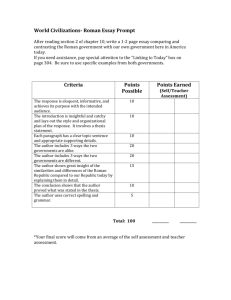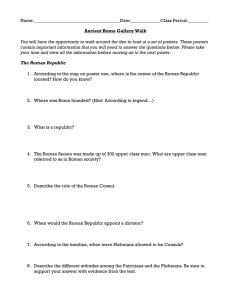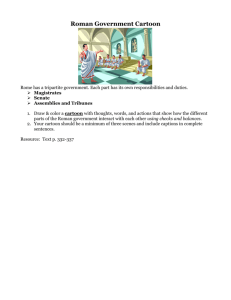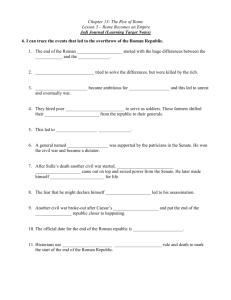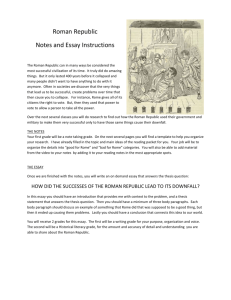Rome Unit - mrslocomb
advertisement
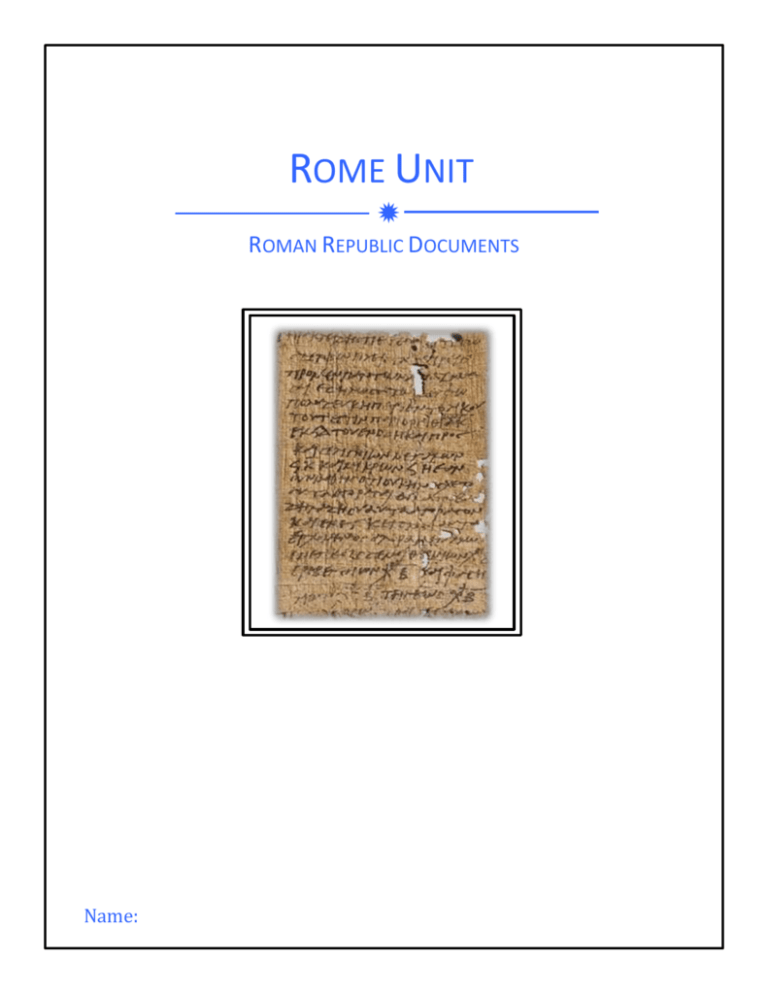
ROME UNIT ROMAN REPUBLIC DOCUMENTS Name: Document A: Polybius (Modified) The following excerpt is the description of the Roman constitution provided by the Greek historian Polybius in his book The Histories written between 167-119 BCE, a period of rapid Roman expansion. Polybius greatly admired the Romans, and the purpose of his work was to describe how Rome came to dominate the world. The Roman constitution has three elements. Each of them possesses independent powers, and their share of power has been so well regulated that no one can say for sure whether the constitution is an aristocracy or democracy or despotism. The Consuls (magistrates) lead the military and are the supreme masters of the government. They bring matters requiring debate before the Senate. They also call together the people’s Assemblies, and carry out whatever the majority of the Assemblies decide. They have absolute authority in running the military and fighting wars and can spend as much public money as they choose. Seeing these powers would justify our describing the constitution as a despotism. The Senate proposes laws and has the control of the treasury. It also handles all crimes requiring an investigation. In addition, if it is necessary to send diplomats to a foreign country to make peace or to proclaim war, this too is the business of the Senate. As a result, many foreign kings imagine the constitution is a complete aristocracy because nearly all the business they had with Rome was settled by the Senate. After all this, someone would naturally ask what part is left for the people in the constitution. There is, however, a part left to the people (the Assemblies), and it is a most important one. It is the people in the Assemblies who grant office to those that deserve it through the elections. The Assemblies also have the final say in passing or repealing laws, and most important of all it is that they make the final decision on the question of peace or war. These considerations again would lead one to say that the chief power in the state was the People's, and that the constitution was a democracy. Vocabulary: Aristocracy: form of government in which the nobility holds power Despotism: form of government where a ruler holds absolute power Magistrates: local officials who administers the law Document B: Professor Fergus Millar (Excerpted from Original) The following text is from The Crowd in the Late Republic, written by Professor Fergus Millar in 1998. The book focuses on the role of Roman people in the government during the final decades of the Roman Republic. Millar is a British historian and professor of Ancient History at Oxford University. The constitution of the Roman Republic made it a variety of democracy. Every adult male citizen, unless specifically disqualified, had a vote, and there was no formal exclusion of the poor. Free slaves could also vote . . . The system within which they voted was characterized by the feature that all voting, without exception, took place within subgroups (Tribal or Century Assemblies). Within each subgroup, the principle of the majority vote prevailed. The vote of each subgroup . . . was determined by the majority of group votes . . . The formal powers of the citizen as voter were divided into three categories. First, there was a residual role of the assembly to meet as criminal courts . . . Then there were elections, conducted by either the Century Assembly or the Tribal Assembly . . . The most fundamental of all the rights of the people was, however, the fact that they, and they alone, could legislate. Proposals for laws could be put before them only by a limited group of elected annual magistrates . . . The normal assembly for the passage of laws was the Tribal Assembly . . . The exclusive right of the assemblies to pass legislation is by far the strongest reason why, in purely formal terms, the Roman Republic has to be characterized as a democracy. Source: Fergus Millar, The Crowd in the Late Republic, 1998. Vocabulary: Anomalous: different from what is standard or expected Legislate: make laws Document C: Professor Alan Ward (Excerpted from Original) The following passage is from an article titled “How Democratic was the Roman Republic?” written by Alan Ward and published in 2003. Ward is a historian and was a professor at the University of Connecticut. If all citizens or their democratically elected representatives in a state have no likelihood of being able to cast their votes regularly, then those who cannot are effectively disenfranchised . . . Under those conditions, one unrepresentative group of voters can easily dominate sovereign popular institutions . . . so that the wishes of the people as a whole are not expressed. That was very much the case in Rome after the early Republic . . . There were very practical barriers to fair and equitable voting in the popular assemblies. For example, all voting had to be conducted in Rome. Once Roman territory had expanded . . . it was mostly the well-to-do rural voters and their clients who could afford the time and expense to come to Rome to vote. How easily a small number of urban residents registered in a rural tribe could determine the vote of that tribe is clear from the small percentage of citizens who actually voted. [Historian] Ramsay MacMullen persuasively argues that only 2% of Roman citizens usually voted, which makes any notion of direct democracy nugatory . . . Also, in Republican Rome, the secret ballot did nothing to change the undemocratic situation in which the voters faced only the legislative and electoral choices presented by the higher magistrates . . . The voters had no role in selecting candidates for office or in proposing legislation in any assembly. The magistrates and tribunes, with or without a prior recommendation from the senate, were the only ones who could place legislation before the voters. Source: Alan Ward, “How Democratic was the Roman Republic?” 2003. Vocabulary: Disenfranchised: deprived of the right to vote Sovereign: possessing ultimate power Equitable: fair direct Democracy: form of government in which citizens vote directly on laws and government actions Nugatory: useless, meaningless The Roman Republic Graphic Organizer Document A: Polybius 1. Sourcing: Who is Polybius? When did he write this? What do you know about why he wrote this document? 2. Close Reading: According to Polybius, what are the “three elements” of the Roman constitution? What powers does each of them have? 1. 2. 3. 3. According to Polybius, how democratic was the Roman Republic? 4. Do you think Polybius is a credible source about how democratic the Roman Republic was? Explain your reasoning. Document B: Fergus Millar 1. Sourcing: Who is Millar? When was this document written? 2. Close Reading: What are Millar’s arguments against those who claim that the Roman Republic was a “top down” system? 3. Close Reading: According to Millar, what powers did the Roman people have? How did that make Rome more democratic? 4. Corroboration: How does Millar’s description of the Roman government compare to Polybius’ description in Document A? Document C: Alan Ward 1. Sourcing: Who is Ward? When was this document written? 2. Close Reading: According to Ward, what barriers might have kept Romans from voting? 3. Close Reading: According to Ward, why didn’t voters in the assemblies have as much power as the magistrates or Senate? 4. Corroboration: How does Ward’s description of the Roman government compare to Polybius’ description in Document A and Millar’s description in Document B? The Roman Republic: Final Conclusion After reading all three documents, to what extent do you think the Roman Republic was democratic? You must give three reasons why and write at least five paragraphs. Make sure to use historical evidence to support your argument!
